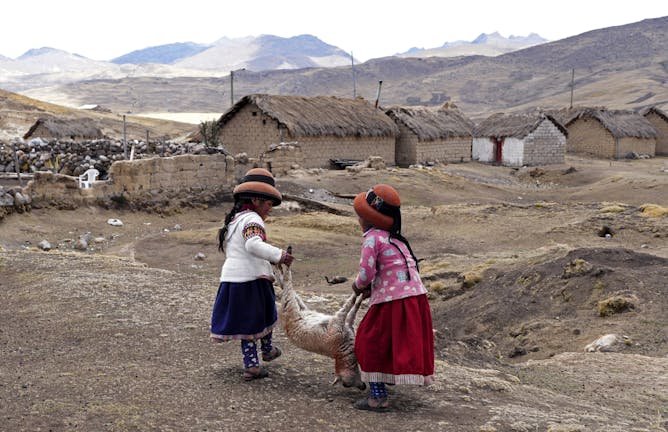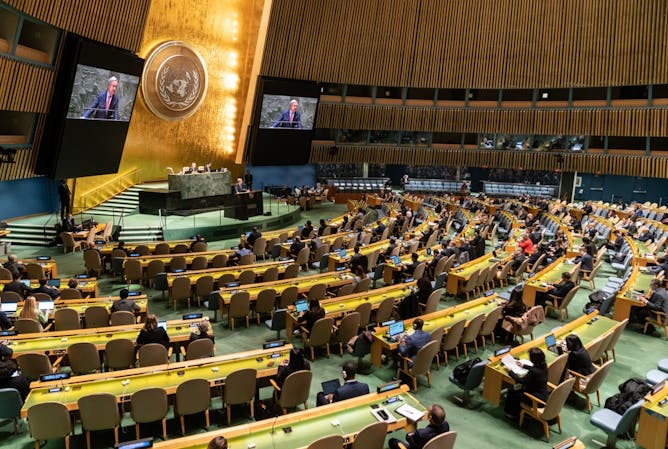|
|
|
|
We’ve been witness to some horrific things in our news feeds lately. Around the world, multiple wars are being waged, with millions of people leaving their homes to escape the violence. This of course includes Gaza, where more than 1.7 million Palestinians have been displaced as Israeli forces continue their onslaught. It also includes Sudan, where civil war has forced more than 10 million people from their homes. In other parts of the world — places like Haiti, Venezuela and Afghanistan — more people are being displaced by political and economic strife.
The Canadian government has responded to some of these global events with programs to accept some of those seeking asylum from what’s happening in their home countries. But there has been deep criticism of these programs because of the disparities between them. For example, Canada has granted almost one million emergency temporary visas to Ukrainians. Meanwhile, there are a maximum of 1,000 spots allotted to Palestinians from Gaza, who face much tighter restrictions.
Clark-Kazak says that for some people, “we’re rolling out the red carpet..in fact, there was even charter flights. Then there’s other groups of people who are facing very similar situations where we’re effectively using all means possible to try to ensure that they will not come here.”
On today’s episode of Don’t Call Me Resilient, Christina Clark-Kazak, professor of public and international affairs at the University of Ottawa, explains that refugee policy in Canada has always been politicized — but never more so than now.
This is Clark-Kazak’s second time on our podcast: she is so good at cutting through the messy, complicated and ever-changing conversation on asylum seekers to Canada.
Also today:
All the best.
|

|
Vinita Srivastava
Host + Producer, Don't Call Me Resilient
|
|

Hanadi Alashi points to Palestinian family members in a photo at her home in Ottawa on Dec. 1, 2023. Alashi is one of many Canadians who have applied for family members to come to Canada under a special extended family visa program created in response to the conflict in Gaza.
THE CANADIAN PRESS/Spencer Colby
Vinita Srivastava, The Conversation; Ateqah Khaki, The Conversation
Refugee programs in Canada have always been politicized, but more so in recent years, evidenced in discrepancies between programs for refugees from Gaza and Sudan and those from Ukraine.
|

William Prince, Julian Taylor, Allison Russell, Aysanabee and Shawnee Kish perform a tribute to the late Robbie Robertson at the Juno awards, in Halifax, on March 24, 2024.
THE CANADIAN PRESS/Darren Calabrese
James Deaville, Carleton University; Jesse Stewart, Carleton University
Paying tribute to departed and living musicians via memorial tributes and awards is a way of lifting up artists’ significant roles defining and shaping musical innovation and cultural identity.
|

Girls carry a dying sheep in the Cconchaccota community of the Apurimac region of Peru as more than 3,000 communities in the central and southern Andes experience its driest period in half a century in November 2022.
(AP Photo/Guadalupe Pardo)
Grace M. Jaramillo, University of British Columbia
Girls bear the brunt of the climate crisis. It’s time we bring them to the centre of international climate policy.
|

Hezbollah fighters hold the group’s flag during a rally to mark Jerusalem day in Beirut, Lebanon, April 14, 2023.
(AP Photo/Hussein Malla)
Emilie El Khoury, Queen's University, Ontario
Since the war began, Israel has exchanged tit-for-tat cross-border attacks with the Lebanese armed group Hezbollah. It is imperative to prioritize diplomatic solutions that end the violence.
|

The public needs to be consulted when developing legislation to regulate artificial intelligence.
(Shutterstock)
Joanna Redden, Western University; Fenwick McKelvey, Concordia University
The Canadian government’s proposed legislation to regulate artificial intelligence doesn’t address the government’s own applications. More oversight and consultations are needed to protect Canadians.
|

Sales of vinyl records continued to increase in 2023 – decades after the LP’s death was forecast by music experts.
(AP Photo/Aaron Doster)
Josh Greenberg, Carleton University
Vinyl’s unlikely comeback story is linked to a combination of slick marketing, claims of superior sound, its polysensorial character and how it evokes nostalgia to construct and reconstitute memory.
|
La Conversation Canada
|

Les objectifs de développement durable ont été conçus pour pallier à la pauvreté extrême, aux inégalités sociales, à la crise climatique et à la perte de biodiversité.
(Shutterstock)
Eric Champagne, L’Université d’Ottawa/University of Ottawa; Cristina D'Alessandro, L’Université d’Ottawa/University of Ottawa
Est-ce que les Objectifs de développement durable (ODD) peuvent contribuer à remplacer les mesures de croissance traditionnelle comme le PIB ?
|
Podcasts
|
-
Gemma Ware, The Conversation; Thabo Leshilo, The Conversation
The first episode of What happened to Nelson Mandela’s South Africa?, a three-part podcast series on The Conversation Weekly. Featuring interviews with Steven Friedman and Sandy Africa.
|
|
Arts
|
-
Sadie Boniface, King's College London
While Back to Black succeeds in avoiding harmful representations of addiction, viewers don’t get a deep insight into its realities and complexities.
|
|
Politics
|
-
Christopher P. Davey, Binghamton University, State University of New York
Rwanda shapes conflict in the region by using the Congolese Tutsi to centre its claims of a continued threat of genocide.
|
|
|
|
|
|
| |
| |
| |

|
| |
| |
| |
| |
| |
| |
|
|
|
|
|
|
|